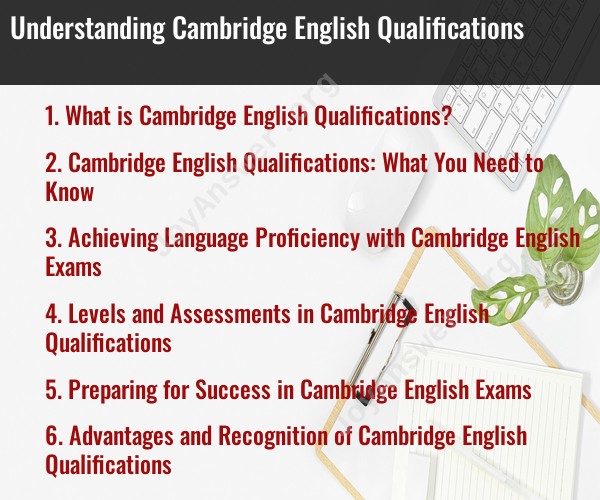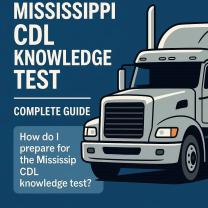What is Cambridge English Qualifications?
Cambridge English Qualifications refer to a series of English language proficiency exams and certifications offered by Cambridge Assessment English, a department of the University of Cambridge. These qualifications are widely recognized and respected worldwide and are designed for non-native English speakers who want to demonstrate their English language skills for academic, professional, or personal purposes. Here's an overview of Cambridge English Qualifications:
Levels and Ranges:
Cambridge English Qualifications cover a broad spectrum of English proficiency levels, from beginner to advanced. The range of exams includes tests for young learners, general English, academic English, business English, and more.
International Recognition:
These qualifications are internationally recognized and accepted by educational institutions, governments, and employers globally. They are often used for university admissions, visa applications, and employment requirements.
Varied Purposes:
Cambridge English Qualifications cater to various purposes, such as improving general English skills, preparing for academic study in English-speaking countries, enhancing business English proficiency, and demonstrating English language competence for personal or professional development.
Assessment Types:
The assessments vary in terms of format and content, depending on the level and purpose. They include multiple-choice, short answer, essay writing, speaking, listening, and reading tasks.
Young Learners:
For children and young learners, there are three levels: Starters, Movers, and Flyers. These exams are designed to assess English language skills in a child-friendly and age-appropriate manner.
General English:
General English exams include the Key English Test (KET), Preliminary English Test (PET), First Certificate in English (FCE), and more. These assess skills needed for everyday communication, travel, and social interactions.
Academic English:
Exams like the International English Language Testing System (IELTS) and the Business Language Testing Service (BULATS) assess language skills required for academic study, research, and professional contexts.
Business English:
The Business English Certificates (BEC) are aimed at assessing English proficiency in a business context and are valuable for professionals looking to enhance their career prospects.
Proficiency Exams:
Cambridge English Qualifications include advanced exams like the Certificate of Proficiency in English (CPE) and the Certificate in Advanced English (CAE) for individuals who require a very high level of English language proficiency.
Test Preparation and Resources:
Cambridge English provides a wide range of test preparation materials, practice exams, and resources to help candidates prepare for their exams and understand the format and expectations of each qualification.
Continuous Development:
Cambridge English Qualifications are regularly updated to reflect current language use and educational standards.
Whether you are a student, a professional, or an individual looking to improve your English language skills, Cambridge English Qualifications offer a comprehensive and well-respected framework for assessing and demonstrating your proficiency in English. Different exams within the Cambridge English Qualifications suite cater to a variety of language learning goals.
Cambridge English Qualifications: What You Need to Know
Cambridge English Qualifications are a suite of English language exams that are developed and assessed by Cambridge Assessment English, a department of the University of Cambridge. These exams are designed to assess learners' English language proficiency at different levels, from beginner to advanced.
Cambridge English Qualifications are recognized by universities, employers, and governments around the world. They are also used by many schools and language schools to assess their learners' English language progress.
Achieving Language Proficiency with Cambridge English Exams
Cambridge English exams are designed to help learners achieve language proficiency in all four English language skills: reading, writing, listening, and speaking. Each exam has a different focus, but all exams assess learners' ability to communicate effectively in English in a variety of real-world contexts.
To achieve language proficiency with Cambridge English exams, learners need to prepare carefully and practice using English regularly. There are many resources available to help learners prepare for Cambridge English exams, including online courses, textbooks, and practice tests.
Levels and Assessments in Cambridge English Qualifications
Cambridge English Qualifications are divided into six levels, which are aligned with the Common European Framework of Reference for Languages (CEFR):
- A1: Beginner
- A2: Elementary
- B1: Pre-Intermediate
- B2: Intermediate
- C1: Advanced
- C2: Proficiency
Learners can choose to take a Cambridge English exam at the level that is appropriate for them. For example, if a learner is at an intermediate level of English, they might take the B2 First exam.
Preparing for Success in Cambridge English Exams
The best way to prepare for success in a Cambridge English exam is to practice using English regularly and to focus on the specific skills that are assessed in the exam. There are many resources available to help learners prepare for Cambridge English exams, including online courses, textbooks, and practice tests.
Here are some tips for preparing for success in a Cambridge English exam:
- Start early: It is important to start preparing for your Cambridge English exam early. This will give you enough time to practice your English skills and to learn about the exam format.
- Identify your strengths and weaknesses: Take a practice test to identify your strengths and weaknesses in English. This will help you to focus your preparation on the areas where you need the most improvement.
- Create a study plan: Create a study plan that outlines what you need to learn and how you will prepare for the exam. Be sure to schedule regular practice sessions into your study plan.
- Find a study partner or group: Studying with a partner or group can be a great way to stay motivated and to practice your English skills.
- Use high-quality preparation materials: There are many high-quality preparation materials available for Cambridge English exams. Be sure to use materials that are aligned with the specific exam that you are taking.
Advantages and Recognition of Cambridge English Qualifications
Cambridge English Qualifications offer a number of advantages to learners, including:
- Global recognition: Cambridge English Qualifications are recognized by universities, employers, and governments around the world.
- Accurate assessment: Cambridge English exams are designed to accurately assess learners' English language proficiency.
- Flexible preparation: There are many different ways to prepare for Cambridge English exams, so learners can find a method that works best for them.
- Personalized feedback: After taking a Cambridge English exam, learners receive personalized feedback on their performance. This feedback can help learners to identify their strengths and weaknesses and to develop their English skills further.
Cambridge English Qualifications are a valuable asset for learners who want to improve their English language skills and achieve their academic and professional goals.











